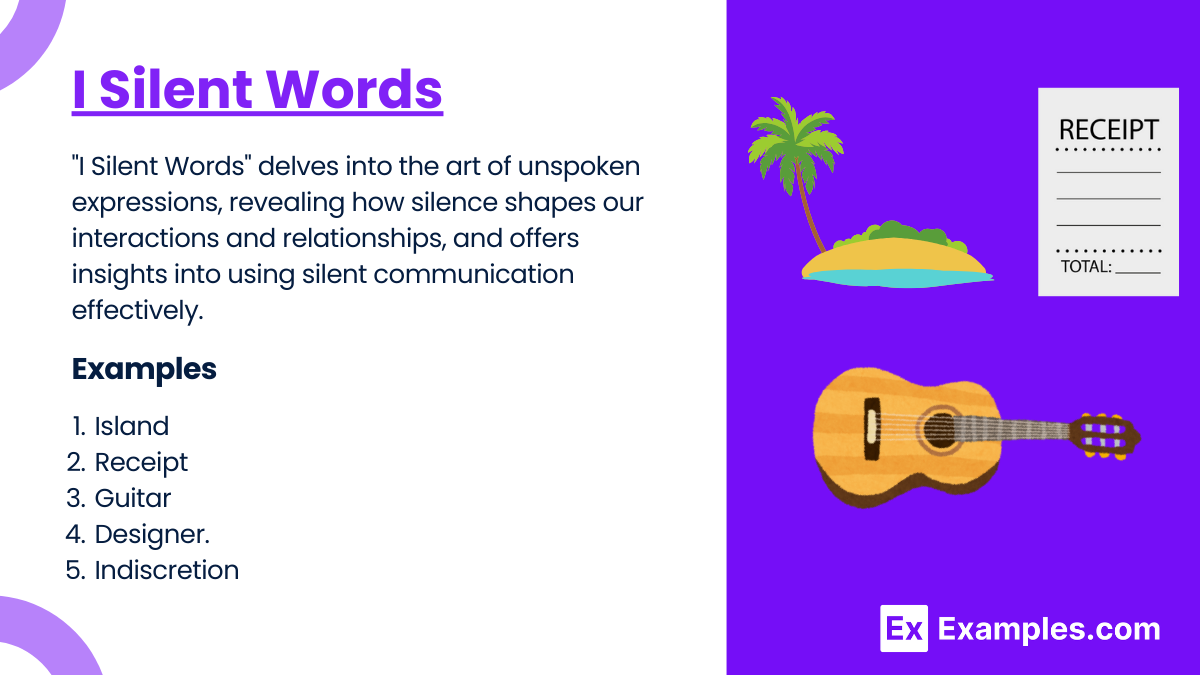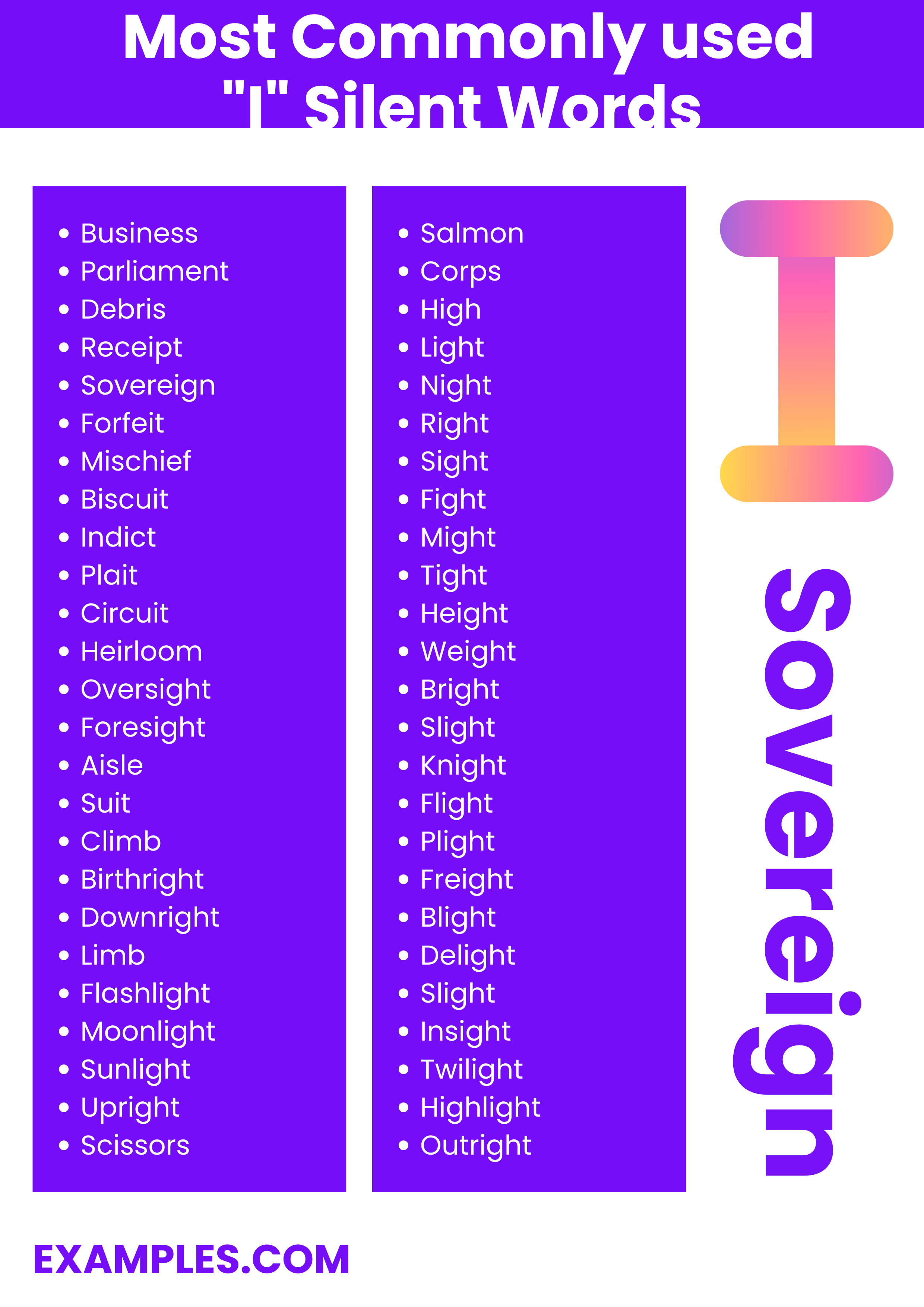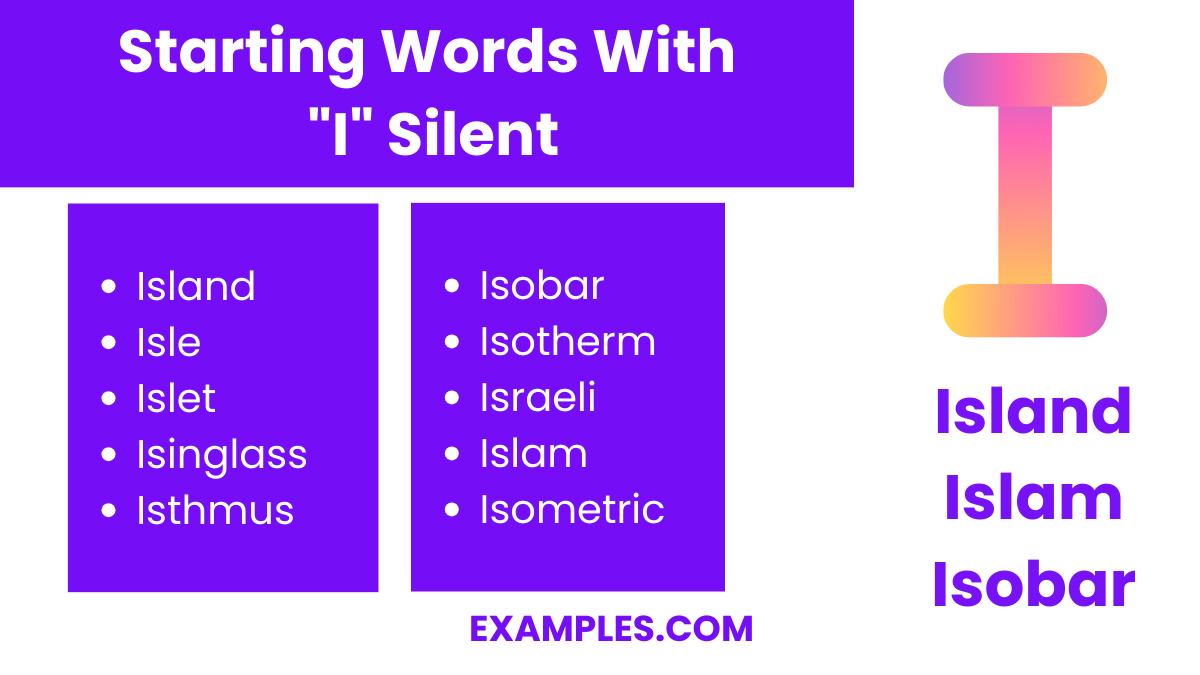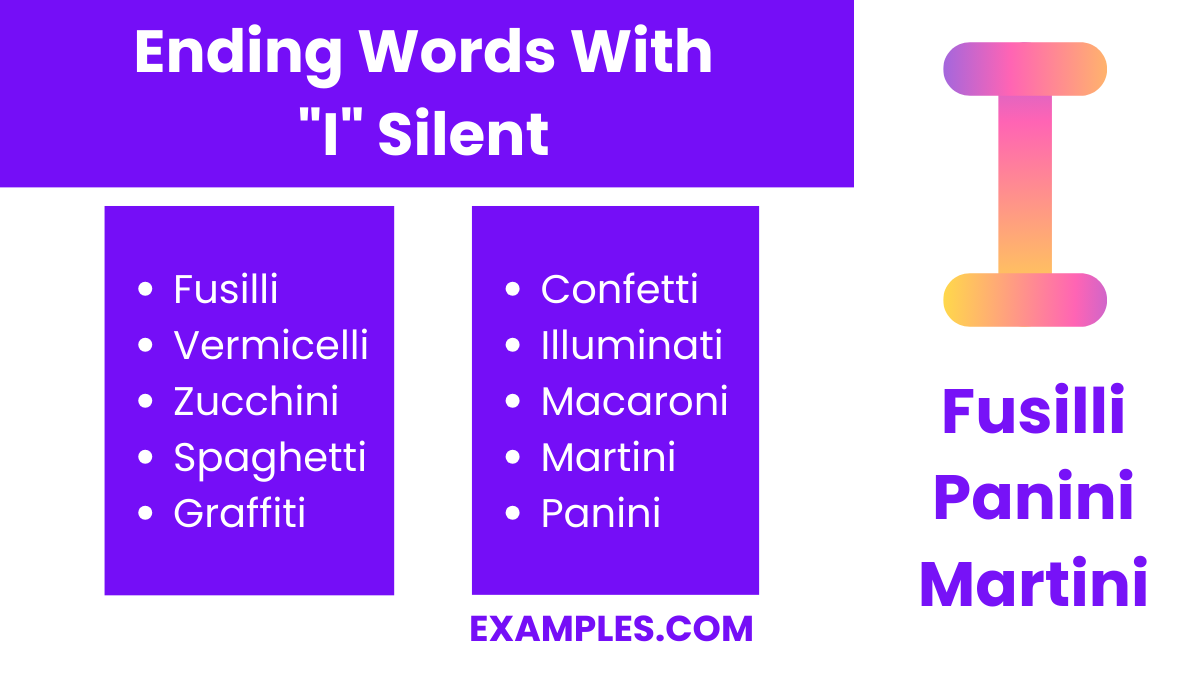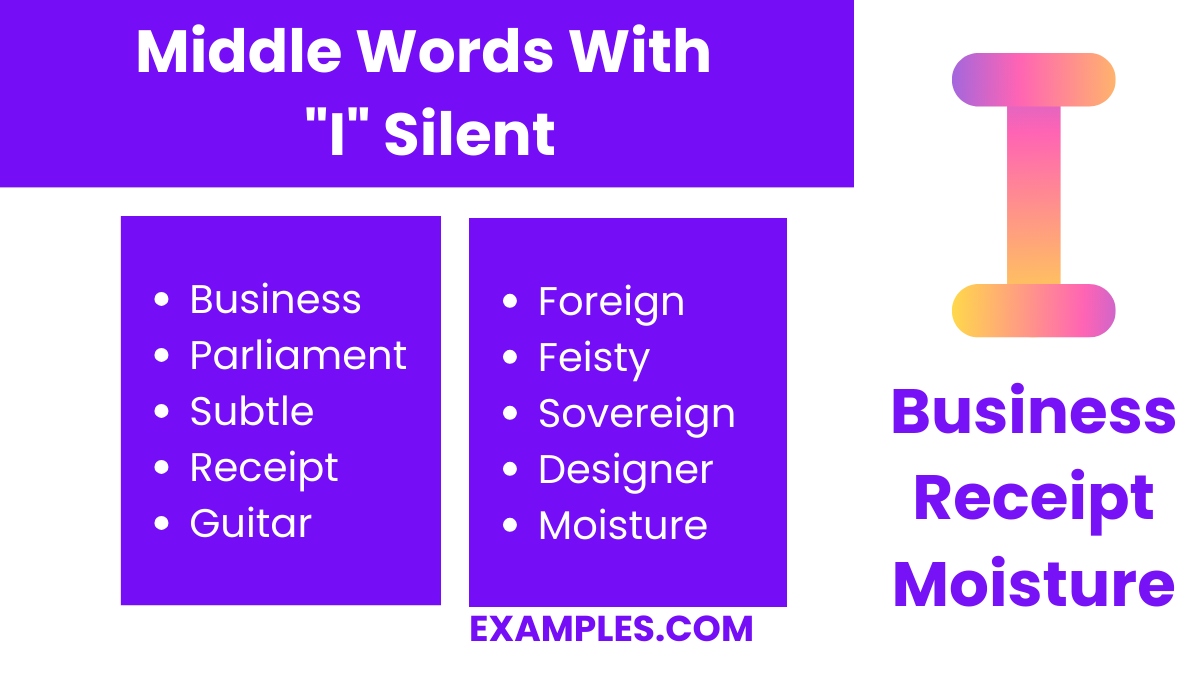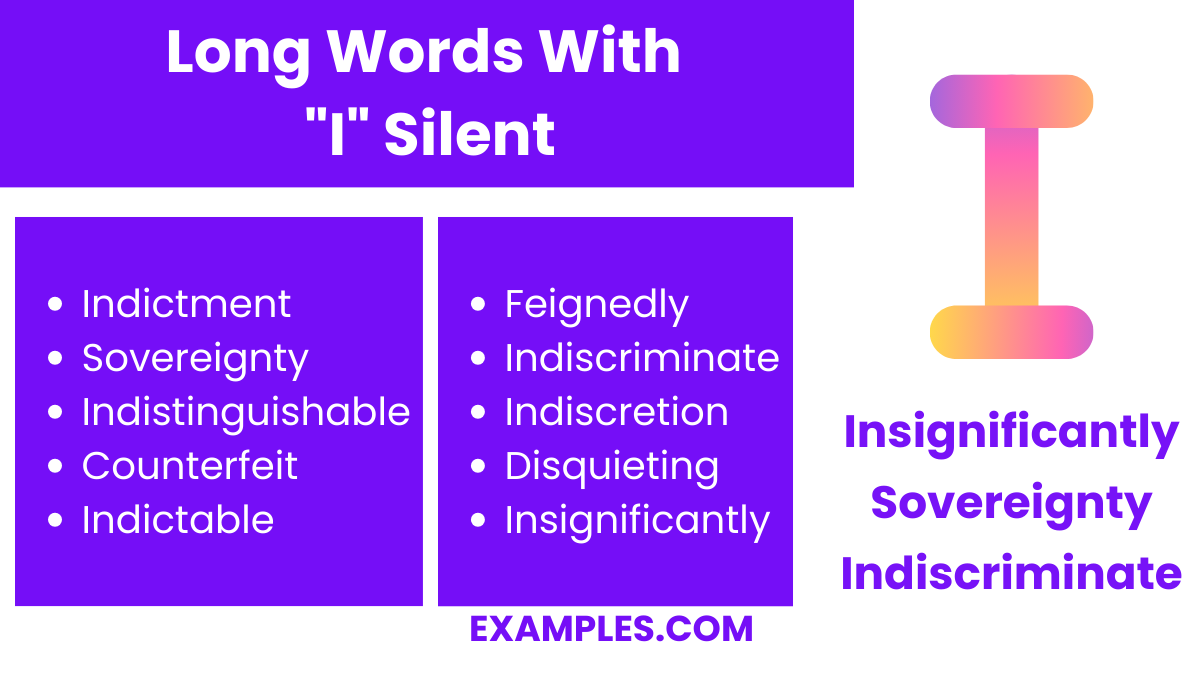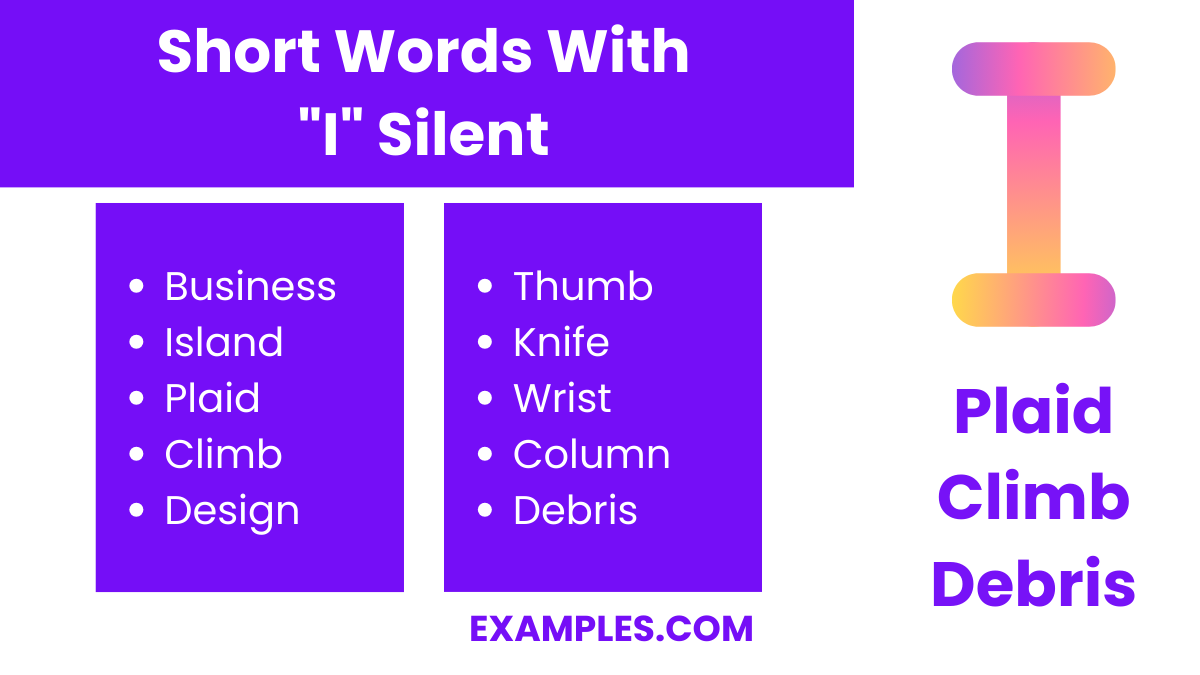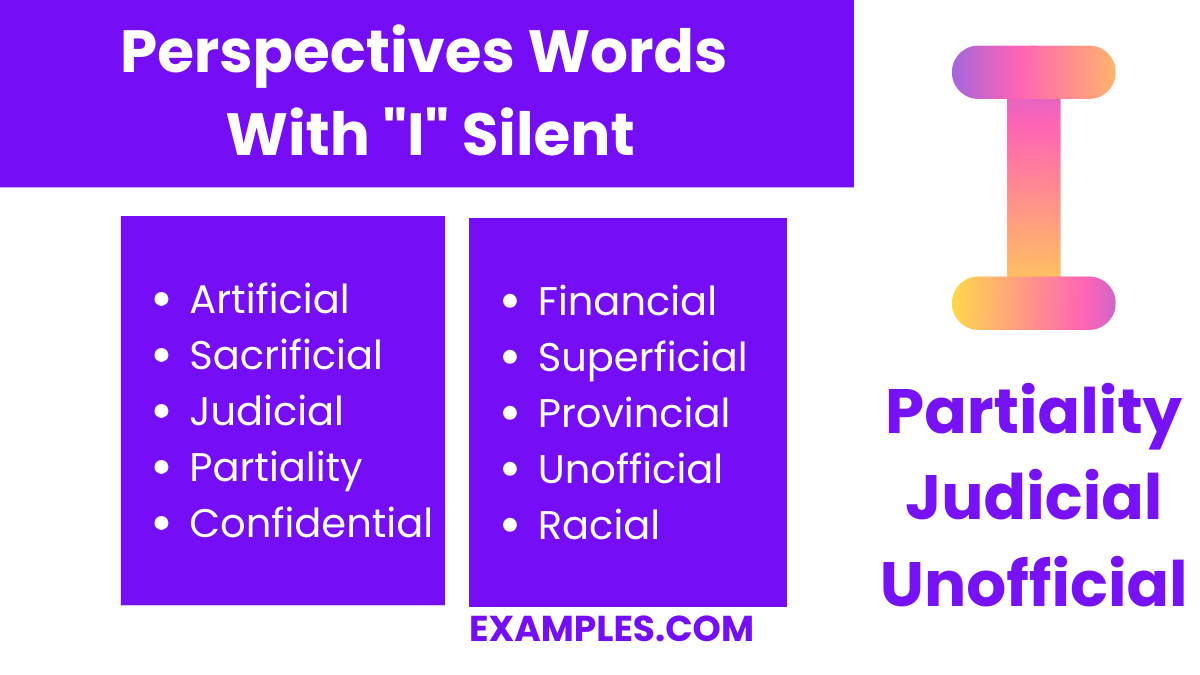450+ I Silent Words List, Meaning, PDF
With over two decades of expertise in crafting compelling content, I understand the power of simplicity in communication. “I Silent Words” explores the nuanced art of unspoken expressions, delving into how silence can speak volumes in our daily interactions and relationships. This piece aims to unravel the complex language of silence, providing readers with insightful ways to interpret and harness the power of unspoken words in enhancing personal and professional connections.
Download Most Commonly Used I Silent Words - PDF
What are I Silent Words?
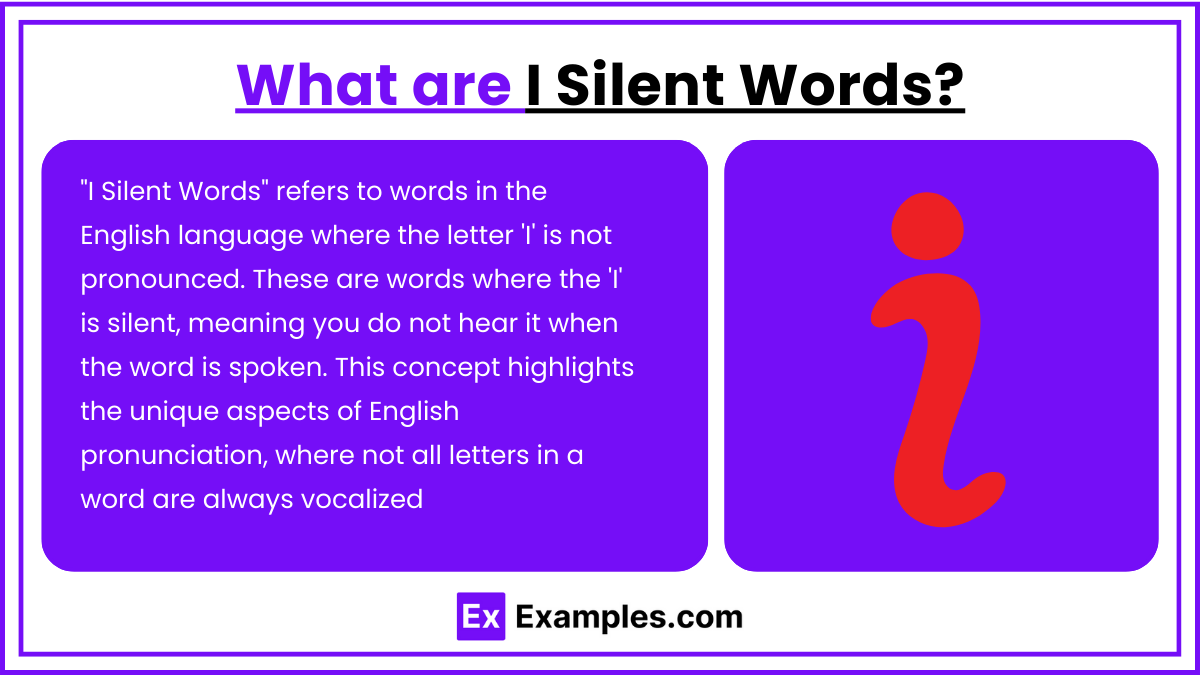
50+ Most Commonly used “I” Silent Words
The English language is full of surprises, and one of its peculia262198rities is the presence of silent letters in words, which can often be a hurdle for learners. These silent letters, crucial for spelling but not pronounced, add a layer of complexity. Among these, the silent “I” stands out, weaving its way silently into many daily use English words. This characteristic often puzzles both native and non-native speakers, especially when grappling with spelling and pronunciation nuances. For educators and students, gaining proficiency in these singular and plural words is essential for enhancing English language skills, encompassing reading, writing, and speaking. By delving into commonly used words that harbor a silent “I”, learners can deepen their understanding of English phonetics and orthography, paving the way for more effective communication. Below is a meticulously compiled table featuring 100 of the most frequently encountered words with a silent “I”, complete with their phonetic pronunciations, to aid students in mastering this intriguing aspect of the language.
| business | ˈbɪznɪs | parliament | ˈpɑːləmənt | debris | dəˈbriː |
| receipt | rɪˈsiːpt | sovereign | ˈsɒvrɪn | forfeit | ˈfɔːrfɪt |
| mischief | ˈmɪstʃɪf | biscuit | ˈbɪskɪt | indict | ɪnˈdaɪt |
| plait | plæt | circuit | ˈsɜːkɪt | heirloom | ˈɛərluːm |
| subtle | ˈsʌtl | drought | draʊt | aisle | aɪl |
| suit | suːt | climb | klaɪm | thumb | θʌm |
| comb | koʊm | limb | lɪm | tomb | tuːm |
| doubt | daʊt | numb | nʌm | column | ˈkɒləm |
| scissors | ˈsɪzərz | salmon | ˈsæmən | corps | kɔːr |
| high | haɪ | light | laɪt | night | naɪt |
| right | raɪt | sight | saɪt | fight | faɪt |
| might | maɪt | tight | taɪt | height | haɪt |
| weight | weɪt | bright | braɪt | slight | slaɪt |
| knight | naɪt | flight | flaɪt | plight | plaɪt |
| freight | freɪt | blight | blaɪt | delight | dɪˈlaɪt |
| slight | slaɪt | insight | ˈɪnsaɪt | twilight | ˈtwaɪlaɪt |
| highlight | ˈhaɪlaɪt | outright | ˈaʊtraɪt | overnight | ˌoʊvərˈnaɪt |
| oversight | ˈoʊvərsaɪt | foresight | ˈfɔːrsaɪt | birthright | ˈbɜːθraɪt |
| downright | ˈdaʊnraɪt | flashlight | ˈflæʃlaɪt | upright | ˈʌpraɪt |
| birthnight | ˈbɜːθnaɪt | moonlight | ˈmuːnlaɪt | sunlight | ˈsʌnlaɪt |
Starting Words With “I” Silent
Dive into the enigmatic world of English words where the initial ‘I’ remains unheard, a phonetic curiosity that challenges and intrigues. This silent ‘I’ often traces its origins to language borrowings and historical phonetic shifts, offering a rich field for linguistic exploration. Educators can use these examples to illuminate the fascinating interplay between spelling and pronunciation, encouraging students to delve deeper into the complexities of English and refine their linguistic skills.
- Island [ˈaɪlənd] – A piece of land surrounded by water.
- Isle [aɪl] – A small island.
- Islet [ˈaɪlɪt] – A very small island.
- Isinglass [ˈaɪzɪŋˌɡlæs] – A form of gelatin obtained from fish, used in food preparation and industrial products.
- Isthmus [ˈɪsməs] – A narrow strip of land with sea on either side, forming a link between two larger areas of land.
- Isobar [ˈaɪsəˌbɑːr] – A line on a map connecting points having the same atmospheric pressure.
- Isotherm [ˈaɪsəˌθɜːrm] – A line on a map connecting points having the same temperature.
- Israeli [ɪzˈreɪli] – A native or inhabitant of Israel.
- Islam [ˈɪzlɑːm] – The religion of the Muslims, a monotheistic faith.
- Isometric [ˌaɪsəˈmɛtrɪk] – Relating to or denoting muscular action in which tension is developed without contraction of the muscle.
Ending Words With “I” Silent
The silent ‘I’ at the end of words, a less common phenomenon in English, often appears in words of foreign origin, adding a layer of sophistication to the language. These ending encouraging words offer students a glimpse into the global influences on English, highlighting its rich linguistic diversity. Teachers can utilize these examples to expand students’ vocabularies and expose them to the vast array of linguistic influences embedded within English, further motivating their exploration and appreciation of the language’s complexity and global nature.
- Fusilli [fuˈzɪli] – A type of pasta in the shape of twisted spirals.
- Vermicelli [ˌvɜːmɪˈtʃɛli] – A type of pasta in the shape of long thin strands.
- Zucchini [zuˈkiːni] – A variety of courgette.
- Spaghetti [spəˈɡɛti] – A type of pasta made in long, slender, solid strings.
- Graffiti [ɡrəˈfiːti] – Writing or drawings scribbled, scratched, or sprayed illicitly on a wall or other surface in a public place.
- Confetti [kənˈfɛti] – Small pieces of colored paper traditionally thrown during celebrations.
- Illuminati [ɪˌluːmɪˈnɑːti] – People claiming to possess special enlightenment or knowledge.
- Macaroni [ˌmækəˈroʊni] – A variety of pasta formed in narrow tubes.
- Martini [mɑːˈtiːni] – A cocktail made with gin and vermouth.
- Panini [pəˈniːni] – A sandwich made with Italian bread, usually toasted.
Middle Words With “I” Silent
Words with a silent ‘I’ nestled within them are linguistic gems that reveal the dynamic and evolving nature of English. These words challenge students to listen closely and articulate with precision, enhancing their phonetic awareness and appreciation for the language’s diversity.
- Business [ˈbɪznəs] – The practice of making one’s living by engaging in commerce.
- Parliament [ˈpɑːlɪmənt] – The highest legislature, consisting of the sovereign, the House of Lords, and the House of Commons.
- Subtle [ˈsʌtl] – So delicate or precise as to be difficult to analyze or describe.
- Receipt [rɪˈsiːt] – A written acknowledgment that a specified article or sum of money has been received.
- Guitar [ɡɪˈtɑːr] – A stringed musical instrument with a fretted fingerboard, typically incurved sides, and six or twelve strings.
- Foreign [ˈfɒrɪn] – Of, from, in, or characteristic of a country or language other than one’s own.
- Feisty [ˈfaɪsti] – Showing courage and strength.
- Sovereign [ˈsɒvrɪn] – A supreme ruler, especially a monarch.
- Designer [dɪˈzaɪnər] – A person who plans the look or workings of something prior to it being made.
- Moisture [ˈmɔɪstʃər] – Water or other liquid diffused in a small quantity as vapor, within a solid, or condensed on a surface.
Long Words With “I” Silent
Embark on a linguistic voyage with long, describing, and difficult words featuring a silent ‘I’, a phonetic curiosity that infuses English with an element of sophistication. These words, rich in history and often derived from various languages, present a unique challenge to both pronunciation and spelling. They stand as a testament to the language’s complexity and serve as ideal resources for educators aiming to broaden their students’ horizons. By incorporating these describing words and difficult words into lessons, teachers can enhance vocabulary and guide students through the intricate nuances of English pronunciation, deepening their appreciation for the language’s diverse influences and intricate structure.
- Indictment [ɪnˈdaɪtmənt] – A formal charge or accusation of a serious crime.
- Sovereignty [ˈsɒvrɪnti] – Supreme power or authority.
- Indistinguishable [ˌɪndɪˈstɪŋɡwɪʃəbl] – Not able to be identified as different or distinct.
- Counterfeit [ˈkaʊntərfɪt] – Made in exact imitation of something valuable with the intention to deceive.
- Indictable [ɪnˈdaɪtəbl] – Liable to be accused or indicted.
- Feignedly [ˈfeɪnɪdlɪ] – In a pretended or insincere way.
- Indiscriminate [ˌɪndɪˈskrɪmɪnət] – Done at random or without careful judgment.
- Indiscretion [ˌɪndɪˈskrɛʃən] – Behavior or speech that displays a lack of good judgment.
- Disquieting [dɪsˈkwaɪətɪŋ] – Inducing feelings of anxiety or worry.
- Insignificantly [ˌɪnsɪɡˈnɪfɪkəntlɪ] – In a manner lacking importance, size, or worth.
Short Words With “I” Silent
Introducing short words with a silent ‘I’ is an excellent strategy for teachers to engage learners in the intricacies of English pronunciation. These words, while brief, challenge the conventional phonetic rules, making them intriguing study subjects for students. They are perfect for lessons focused on phonetic awareness and can help students improve their spelling and pronunciation skills in a fun and accessible manner.
- Business [ˈbɪznəs] – The practice of making one’s living by engaging in commerce.
- Island [ˈaɪlənd] – A piece of land surrounded by water.
- Plaid [plæd] – A patterned cloth, especially one with a tartan or checked pattern.
- Climb [klaɪm] – To ascend or go up using the feet and often the hands.
- Design [dɪˈzaɪn] – To create a plan or drawing to show the look and function before it is made.
- Thumb [θʌm] – The short, thick first digit of the human hand.
- Knife [naɪf] – An instrument for cutting, consisting of a blade and a handle.
- Wrist [rɪst] – The joint connecting the hand with the forearm.
- Column [ˈkɒləm] – A vertical structure used as a support or to stand something upon.
- Debris [ˈdɛbriː] – Scattered fragments, typically of something wrecked or destroyed.
Perspectives Words With “I” Silent
Words with a silent ‘I’ that offer diverse perspectives are linguistic treasures, providing depth and richness to discussions and writings. These terms, embodying various concepts and ideas, are invaluable for educators aiming to inspire critical thinking and expressive communication skills in their students. They facilitate exploration of complex themes, encouraging students to articulate nuanced viewpoints and engage in meaningful dialogue.
- Artificial [ˌɑːtɪˈfɪʃəl] – Made or produced by human beings rather than occurring naturally.
- Sacrificial [ˌsækrɪˈfɪʃəl] – Relating to or constituting a sacrifice.
- Judicial [dʒuːˈdɪʃəl] – Pertaining to the administration of justice or the function of a judge.
- Partiality [ˌpɑːʃɪˈælɪti] – Unfair bias in favor of one thing or person compared with another.
- Confidential [ˌkɒnfɪˈdɛnʃəl] – Intended to be kept secret.
- Financial [faɪˈnænʃəl] – Relating to finance.
- Superficial [ˌsuːpəˈfɪʃəl] – Existing or occurring at or on the surface.
- Provincial [prəˈvɪnʃəl] – Pertaining to the regions outside the capital city of a country.
- Unofficial [ˌʌnəˈfɪʃəl] – Not officially authorized or confirmed.
- Racial [ˈreɪʃəl] – Relating to race or the differences between human races.
In conclusion, exploring silent “I” words unveils the nuanced layers of English pronunciation, offering a gateway to advanced linguistic understanding. This journey not only enriches vocabulary but also sharpens pronunciation skills, fostering a deeper appreciation for the language’s complexity. Embrace these silent letters as keys to unlocking a more sophisticated and articulate command of English, essential for both educators and learners alike.
FAQs
Can you list some common “I Silent Words”?


